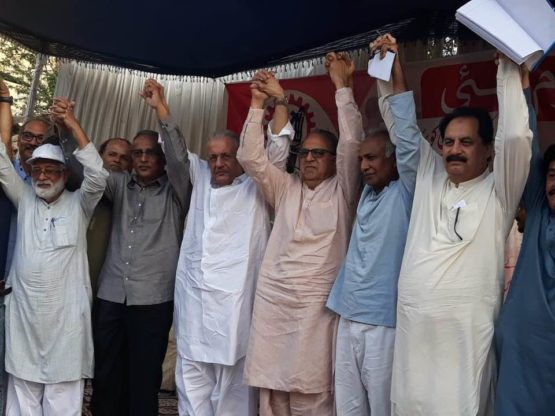- About
- Topics
- Picks
- Audio
- Story
- In-Depth
- Opinion
- News
- Donate
- Signup for our newsletterOur Editors' Best Picks.Send
Read, Debate: Engage.
| topic: | Political violence |
|---|---|
| located: | Pakistan |
| editor: | Shadi Khan Saif |
Over the years, the unsustainable model of the media industry in Pakistan has been fostering disparities, with those at the bottom being further pushed to extreme poverty.
A few days ago, when I first saw a Karachi-based journalist breaking down in tears during a live TV show due to extreme poverty, I thought of it as a random case of joblessness; but no, in fact, every other journalist I spoke to later said they were hardly making ends meet.
The press photographers - those who are most exposed to grim threats such as angry mobs, street crimes, bomb blasts, etc. – are worst affected by the trickle down impacts of the nationwide economic downfall the country faces. Some said they have been forced to work for as little as 10,000 rupees (around $60) per month, and there were many others who were not paid at all for months.
In this distressing era of the coronavirus pandemic, for journalists who are at the frontlines of the pandemic to be in this situation - is appalling.
It is true that many workers in Pakistan are faced with similar hardships as the country of over 200 million remains on the ‘Grey List’ of the Paris-based Financial Action Task Force over alleged charges of money-laundering and terror financing.
The reason why those associated with the press and news media - the fourth estate or fourth power of state - should have decent work conditions and job security is so that it could function in its role as a robust social influencer to keep the government in check. Had the press been free and strong enough in the first place, it could have held the political system accountable and perhaps prevented the government from pursuing the policies that enlisted the country in the ‘Grey List’ in the first place.
Though not formally recognized as a part of the political system, a free and robust press is nonetheless the only hope for poor and marginalised to express their opposition towards the policies peddled at the higher level that deprive them or pose a threat to their basic rights, such as job security and freedom of speech and choice.
What we have witnessed in places like Pakistan is the dark forces in the power quarters managing to ‘buy’ the voice and power of free press by luring the media owners and leaving working journalists in shambles. This is also done through tax subsidies for the wealthier individuals and corporate figures.
The working journalists, as like many other labourers, are blatantly denied all due rights such as basic salary, social security, etc.
Frankly speaking, it is very alarming to see in places like Pakistan the guardians of democracy, working journalists, getting pushed to extreme poverty.
Image: Phạm Anh Minh.

